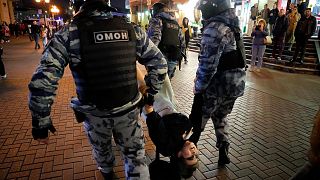Almost 1,200 protesters have been arrested in cities across Russia as they protested President Vladimir Putin’s order to mobilise 300,000 troops to fight in the Ukraine war.
Putin’s speech sparked protests in at least 37 cities, including St Petersburg and the capital Moscow, according to the independent Russian human rights group OVD-Info.
Journalists in Moscow witnessed at least a dozen arrests in the first 15 minutes of a protest, as participants risks Russia’s harsh laws on criticising the military and the war.
Asked whether protesting would help, one Muscovite who declined to give their name said: “It won’t help, but it’s my civic duty to express my stance. No to war!”
In Yekaterinburg, Russia’s fourth-largest city, police hauled onto buses some of the 40 protesters who were detained at an anti-war rally.
One woman in a wheelchair shouted, referring to the Russian president: “Goddamn bald-headed ‘nut job’. He’s going to drop a bomb on us, and we’re all still protecting him. I’ve said enough.”
“Thousands of Russian men – our fathers, brothers and husbands – will be thrown into the meat grinder of the war. What will they be dying for? What will mothers and children be crying for?” the Vesna opposition movement said, calling for demonstrations.
SPONSORED CONTENT
Mergers and acquisitions (M&A) doesn’t always get the love it deserves, but it should. Across the economy, M&A delivers huge value to everyone when it’s done right. For strategically smart…
